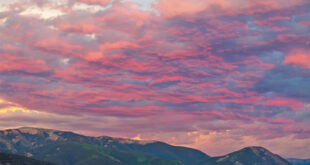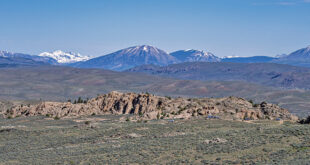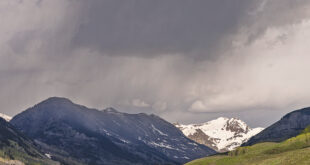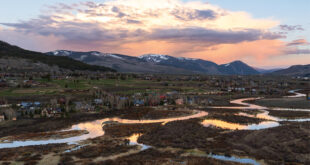There’s a lot of “I don’t knows” happening right now.
There’s the big one of: I don’t know why we are losing some of the really nice people from the Crested Butte tribe. Several medium ones, like: I don’t know why taxing a bong will keep local kids healthier or how a quiet e-bike will really destroy the concrete Rec Path experience, and small ones, like: I don’t how many people were here for the Fourth of July.
Starting with the small one: It seemed to me there were fewer people on the street for the Fourth of July parade this year. The crowd didn’t seem as deep at Third and Elk and the one drone shot I saw made it look pretty sparse in front of the Princess. Mountain Express buses carried more than 5,000 people on the Fourth but that was off by about 9 percent compared to last year. Ashley UpChurch of the Chamber of Commerce, who puts on the parade, said she thought it was more crowded. “It looked busier than last year to me. We had more floats including more out-of-towner floats, too,” she said. Chief marshal Mike Reily said he wasn’t sure, but one of his deputies “hazarded a guess that about 12,000 people were here for the parade, which was a bit more than the 2018 estimate of 10,000. But I would guess it was similar to last year,” he said.
So I thought fewer, Ashley thought more and Mike thought about the same. I don’t know.
I don’t know why we are suddenly seeing homes in town selling for $3 million or $4 million in Crested Butte. I mean, I get the economics 101 supply-and-demand basics and town has a finite supply of houses. Apparently there is a lot more money flowing into the upper valley than in the past and that matters. But it feels like we skipped over the $1.7 million or $2.4 million or $2.8 million price points. I don’t know why we made that jump so quickly.
I don’t know why some on the Crested Butte town Council are touting their nicotine tax proposal as a way to save the children of the valley from the health dangers of tobacco. Seems to me it’s about the money. And it’s not a bad chunk of change, with the potential to bring in an additional six figures to the town coffers by taxing anything to do with tobacco and nicotine. Will it stop kids from smoking if they have to pay 15 cents more a cigarette (about $3 per pack) or 40 percent more for a Juul pod? Doubt it. But maybe. I don’t know. I do know that Tobacconist owner John Penn makes a really good point when he points the finger and says if the council is truly worried about the health of local kids and thinks a big tax really works—they should ban vapes and tax the heck out of alcohol and weed (more than now) and add fees for teen driving and give away sunscreen, books and helmets and mandate library visits and…. I don’t know if that will happen.
I don’t know how much sales tax revenue the towns are losing because local businesses are having to close one or two days a week because they can’t find enough workers. Part of the problem is there are more jobs out there so the same workers we have in the valley are spread thin. Part of the reason is that it’s harder to find a cheap place to live in the valley. The rents in the classifieds last week ranged from $1,400 a month for a one-bedroom in Meridian Lake to $3,500 for a three-bedroom in Skyland. I don’t know how people can stay here and be a ski bum for a few years anymore. I don’t know for sure, but I don’t think a store or restaurant generates sales tax when it is closed.
I don’t know if I’d be more afraid of professionals driving big logging trucks down Whiterock Avenue or texting tourists searching for “Keebler Pass” on Google Maps. I remember seeing the trucks coming down from the Floresta cut a few years ago and it wasn’t particularly alarming. And I saw on the internet this week that some woman crashed into a parked car on the southwest side of town after she blew a stop sign while looking at her phone. Seems to me if the timing could be controlled and the logging activity could help mitigate future beetle infestation or wildfires—something I don’t know for sure because my smart friend Denis tells me that science hasn’t been proven—it shouldn’t be a giant problem. We do live in a place surrounded by a lot of trees. But it is early in the process and Matt McCombs from the Forest Service understands the public worry and is looking at alternatives so I don’t know what the perfect answer is yet.
And then there are the good people dying. People like Diner Theaker, Kathy Joyce and Tom Vulich who have all passed in the last few days or weeks. Not a bad one in the bunch. I just don’t know why the nice ones are making the journey to the other side.
I don’t lament people dying so much—even friends. From my early trips to India I sort of absorbed that we’re all going there at some point and once the soul, that spark of energy that kindles life, leaves the body that body is an empty shell that is done serving its purpose. I figure A) the adventure is either going to continue and be really cool or B) it’s all done. I’m betting on A and hope it will be really cool on the other side and we might even get back here in some form or fashion, with some lessons learned to apply the next time.
But recently the problem is that the people leaving this plane and this place are nice. We’re losing some good ones and while hopefully they are in the next phase having a really good time, we’re left with fewer nice people in this place. It’s evident that all of them—Diner, Kathy, Tom—brought something to the table and were teachers of sorts. Diner’s irreverence, Tom’s listening skills, Kathy’s questioning, all taught us something if you were open to learning. And isn’t that one of the reasons we’re here—to learn? And to love? All of them were funny and all of them were—nice. We can always use nice and funny in the world, even here in paradise. So I’m not sure what the lesson of their passing is right now. But there is one.
Maybe it is simply that life goes on. And even in times of sadness we all have to deal with things like e-bikes on concrete and logging trucks, cigarette taxes and people in the parade. Maybe it is that life is a journey full of lessons and it is up to each of us to open up enough to learn something.
I don’t know—but it sure seems worth trying.
—Mark Reaman
 The Crested Butte News Serving the Gunnison Valley since 1999
The Crested Butte News Serving the Gunnison Valley since 1999






